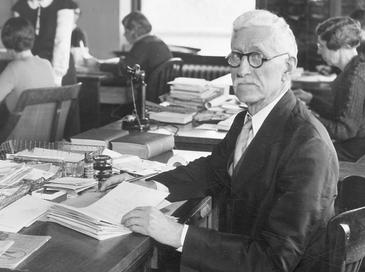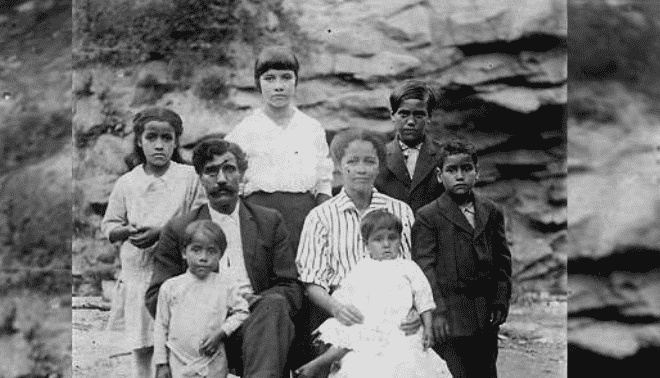Welcome to DU!
The truly grassroots left-of-center political community where regular people, not algorithms, drive the discussions and set the standards.
Join the community:
Create a free account
Support DU (and get rid of ads!):
Become a Star Member
Latest Breaking News
General Discussion
The DU Lounge
All Forums
Issue Forums
Culture Forums
Alliance Forums
Region Forums
Support Forums
Help & Search
Walter Plecker: White Supremacy, Eugenics, Anglo-Saxon Clubs, 1924 Racial Integrity Act: Melungeons
Last edited Sat May 8, 2021, 03:07 PM - Edit history (4)

- Walter Plecker, Registrar, Virginia Bureau of Vital Statistics, 1935.
Wiki, - Excerpts, Ed.: Walter Ashby Plecker (April 2, 1861 – Aug. 2, 1947) was an American physician and public health advocate who was the first registrar of Va.'s Bureau of Vital Statistics, serving 1912- 1946. He was a leader of the Anglo-Saxon Clubs of America, a white supremacist organization founded in Richmond, Va., in 1922. He drafted and lobbied for the passage of the Racial Integrity Act of 1924 by the Virginia legislature; it institutionalized the one-drop rule. - Early life and education: Plecker was born in Augusta County, the son of a returned Confederate veteran. Sent to Staunton as a boy, he graduated from Hoover Military Academy in 1880 and obtained a medical degree from the Univ. of Md. in 1885. He was a devout Presbyterian, and throughout his life he supported the denomination's fundamentalist Southern branch, funding missionaries who believed, as he later would, that God had destroyed Sodom and Gomorrah as punishment for racial intermixing.
- Career: Plecker settled in Hampton, Va., in 1892, and before his mother's death in 1915, he worked with women of all races and became known for his active interest in obstetrics and public health issues. Plecker educated midwives, invented a home incubator, and prescribed home remedies for infants. His efforts are credited with an almost 50% decline in birthing deaths for black mothers. Plecker became the public health officer for Elizabeth City County in 1902. In 1912, Plecker became the first registrar of Va.'s newly created Bureau of Vital Statistics, a position he held until 1946. An avowed white supremacist and an advocate of eugenics, he became a leader of the Anglo-Saxon Clubs of America in 1922. He wanted to prevent miscegenation, or marriage between races, and he also thought that a decreasing number of mulattoes, as classified in the census, meant that more of them were passing as white.
.. Plecker drafted and the state legislature passed the "Racial Integrity Act of 1924". It recognized only 2 races, "white" and "colored" (black). It essentially incorporated the one-drop rule, classifying any individual with any amount of African ancestry as "colored". This went beyond existing laws, which had classified persons who had one-sixteenth (equivalent to one great-great-grandparent) or less black ancestry as white. In 1967, the United States Supreme Court invalidated the law in Loving v. Virginia..
Plecker resented African Americans who passed as Native Americans, and he came to firmly believe that the state's Native Americans had been "mongrelized" with its Af- Amer population.. Since shortly after the Civil War, Native Americans from all over the country had been brought to the Hampton area to be educated with blacks.. The eugenics movement grew in the state. Plecker refused to recognize the fact that many mixed-race Va. Indians had maintained their culture & identity as Native Americans over the centuries despite economic assimilation. Plecker ordered state agencies to reclassify most citizens who claimed American Indian identity as "colored", although many Virginian Native Americans continued to live in their communities & maintained their tribal practices. - Death: Plecker was hit by a car while crossing a Richmond street, & he died on Aug. 2, 1947. He is buried in Hollywood cemetery in Va. beside his wife. They had no children. For years Plecker never sought out friends, & he described his hobbies as "books & birds", he gained a reputation for never smiling. His obituary in the Richmond Afro-American newspaper was headlined: "Dr. Plecker, 86, Rabid Racist, Killed by Auto".
Plecker's racial policies continue to cause problems for the descendants of what are now sometimes called the First Virginians. Members of 8 Virginia-recognized tribes struggle to achieve federal recognition because they cannot prove their continuity of heritage...
More, https://en.wikipedia.org/wiki/Walter_Plecker
___________
- The Anglo Saxon Clubs of America was a white supremacist political organization which was active in the U.S. in the 1920s, and lobbied in favor of anti-miscegenation laws and against immigration from outside of Northern Europe. Founded in Richmond, Va., in 1922 by musician and composer John Powell and explorer Earnest Sevier Cox, the organization had 400 members in 1923 and 32 "posts" by 1925 and was open only to white male members. The organization was successful in lobbying for tougher legislation, and is credited with having secured the passing of the Racial Integrity Act of 1924.
The organization has been described as "an elitist version of the Ku Klux Klan".
https://en.wikipedia.org/wiki/Anglo-Saxon_Clubs_of_America
___________
- The Horrifying Roots of Nazi Eugenics, The Master Race, DU, 2021
https://www.democraticunderground.com/1016291868
___________

- (Wiki) Melungeons is a term for numerous groups of people of the Southeastern U.S. who descend from European and Sub-Saharan African settlers. Historically, the Melungeons were associated with settlements in the Cumberland Gap area of central Appalachia, which includes portions of East Tenn., Southwest Va., and eastern KY. Tri-racial describes populations who claim to be of mixed European, African and Native American ancestry. Although there is no consensus on how many such groups exist, estimates range as high as 200. Melungeons are descendants of early Portuguese, Spanish, Jewish, Muslim Moorish, and Romani colonists.
The ancestry and identity of Melungeons has been a highly controversial subject. Secondary sources disagree as to their ethnic, linguistic, cultural, and geographic origins and identity. They might accurately be described as a loose collection of families of diverse ethnic origins who migrated to frontier areas, settled near each other, and intermarried, mostly in Hancock and Hawkins counties in Tenn., nearby areas of KY, and in Lee County, Va. Their ancestors can usually be traced back to colonial Virginia and the Carolinas. They were largely endogamous through the 19th century, marrying primarily within their community until about 1900...
https://en.wikipedia.org/wiki/Melungeon#:~:text=Melungeons%20(%2Fm%C9%99%CB%88l,and%20Sub%2DSaharan%20African%20settlers.
________
- NPR, For Some People of Appalachia, Complicated Roots, 2012,
https://www.npr.org/2012/07/11/156611575/for-some-people-of-appalachia-complicated-roots
_________
- Where Do We Come From? Discover Magazine, 2003,
https://www.discovermagazine.com/planet-earth/where-do-we-come-from
.. In the United States, where the proverbial drop of blood was once enough to distinguish a freeman from a slave, telling such stories is far more than a pastime. Less than a century ago, for instance, the Melungeons' hazy racial status was enough to win them a long list of enemies. Virginia townspeople once hauled them into court for attempting to vote and hung them for marrying white women. One crusading Virginia state registrar launched a campaign in the 1930s and 1940s to hunt down all Melungeons and reclassify them as "colored." [W. Plecker]. The term Melungeon was a slur until recent decades. "The Melungeons were always some other family who lived over on the other ridge," says Jack Goins, a retired glass cutter and television technician who has spent decades researching his ancestors. Darlene Wilson, a 50-year-old administrator and history teacher at Southeast Community College in Kentucky, says that when she was a teenager in the 1960s, working at a lunch counter in Norton, Virginia, her boss made her scrub the booth after the Melungeons had finished eating.
Growing up in Wise, Virginia, Brent Kennedy had no clue that he was related to those shy-looking people who kept to themselves up in the Appalachian hills. He didn't look particularly Gaelic, with his cornflower blue eyes and bronze skin, but Melungeon roots were something polite people didn't talk about. After he began his genealogical research in the late 1980s, one great-aunt torched a collection of family photos and letters, and other relatives stopped speaking to him. When Kennedy approached scholars with his questions, they couldn't be bothered. Anthropologists and historians like Virginia DeMarce of the Bureau of Indian Affairs in Washington, D.C., had already settled the Melungeon question, they said. Kennedy's people were an insular group like the Louisiana Red Bones and the South Carolina Brass Ankles. They were a "triracial isolate" with white, American Indian, and African-American blood—a footnote in history.
So Kennedy did his own research instead. His book, The Melungeons: The Resurrection of a Proud People, is part memoir, part manifesto. It draws on his family story and genealogy to show how the Melungeons, like African-Americans and American Indians, have been victims of vicious racism—and how they have struggled to protect themselves through assimilation. Kennedy's thesis became a rallying cry for many Melungeons, but historians scoffed at his less-than-rigorous approach. Kennedy "essentially invented a 'new race,'" DeMarce wrote in the National Genealogical Quarterly in 1996, a "historically nonexistent oppressed minority that belies his own ancestry."...
InfoView thread info, including edit history
TrashPut this thread in your Trash Can (My DU » Trash Can)
BookmarkAdd this thread to your Bookmarks (My DU » Bookmarks)
0 replies, 1643 views
ShareGet links to this post and/or share on social media
AlertAlert this post for a rule violation
PowersThere are no powers you can use on this post
EditCannot edit other people's posts
ReplyReply to this post
EditCannot edit other people's posts
Rec (5)
ReplyReply to this post